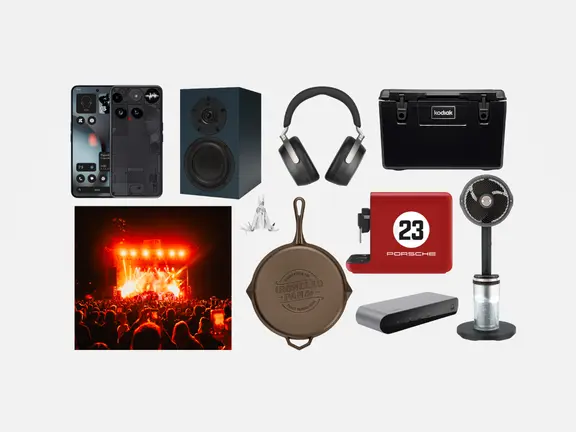
Published:
Readtime: 9 min
Every product is carefully selected by our editors and experts. If you buy from a link, we may earn a commission. Learn more. For more information on how we test products, click here.
Memory improvement is not much different than physical improvement in that both require conscious effort and daily dedication. However, figuring out how to improve memory and concentration doesn’t necessarily involve drastic lifestyle changes. Instead, you learn to re-prioritise some of the things you’re already doing (like sleeping, laughing, eating, and socially interacting) while throwing in a few extra hacks and activities. Put it all together and you’ll be boosting brain power and memory in no time!
So how does one improve memory, focus, and concentration? To answer that question, we’ve assembled a list of 10 different ways to boost brain function. Some are more involved than others and all are backed by research. What you won’t find are miracle cures and sketchy supplements, though don’t let that stop you from experimenting.
Of course, even if you do take on a supplement program, no pill in the world will improve memory or concentration if you’re not sleeping well, eating well, and living well. Here’s how to boost that brain and then keep it in top shape.
1. Train Your Brain
While your brain isn’t technically a muscle, it can often be trained like one. To put it another way: the more you challenge your memory, the more your memory will improve. Thankfully, there are tons of brain-boosting activities that you can practice every day, ranging from crossword puzzles to brain training apps to full-blown educational courses.
Ultimately, the best brain-boosters are the ones that continue to put your mental acuity to the test. For example, learning a tough new skill can often lead to memory improvement because you must dedicate time and patience while progressing at a gradual pace. In the same sense that learning how to speak or walk once took effort and concentration, so too does learning how to repair a car engine or even knitting a sweater. When the activity has become second nature, you should move on to the next challenge.
A quick note for all the gamers out there: while some research suggests that playing video games will boost brain power, just remember that the line between education, entertainment, and addiction can get downright blurry. A little moderation can go a long way, is all we’re really saying. By contrast, if you’re playing eight hours of Call of Duty every day, it’s probably causing more harm than good. Just a hunch. Sorry!
2. Physical Exercise
As if there was any doubt, physical exercise remains fundamental to a healthy mind and body alike. Since we’re focusing on how to improve memory and concentration, we’ll leave the physical benefits for another article and focus on the mental benefits. To that end, a quality workout increases oxygen flow to your brain, reduces stress, improves neuroplasticity, and decreases your risk for diseases and disorders.
If you’re working out with the goal of improving memory, be sure to incorporate plenty of cardio such as running or swimming, along with activities that hone your hand-eye coordination. Should you want to go the full distance, consider rock climbing, which plays upon your fight-or-flight instincts and sharpens your mental awareness, among other things.
3. Get Plenty of Sleep
Here’s another no-brainer brain booster: sleep for about eight hours per night. Anything under seven hours will deprive you of mental energy and anything over nine hours is like biting the hand that feeds you. Hit the sweet spot (i.e. eight hours) every night and you can pretty much always tell the difference in regards to memory, creativity, critical thinking, and productivity.
To make sure you’re getting the sleep you need, practice going to bed and waking up at the same time every night and day, even on the weekends. You should stay away from bright screens for at least an hour before bedtime, picking up a book instead. Also, consider cutting down on your caffeine intake if you think it’s affecting your ability to fall asleep or stay asleep.
4. Develop Meaningful Relationships
It might sound a little sappy, but forming and retaining friendships is one of the best things you can do for your brain. In fact, a recent study determined that people with active social lives experienced the slowest rates of memory decline.
But you don’t need a study to tell you that developing important relationships will improve both emotional health and mental health because you—like pretty much everyone else in this world—are a social being at heart. And while an abundance of isolation might lead to the occasional burst of insight, it can do serious harm in the long run.
Also, don’t mistake online engagement for meaningful relationships. What’s important is that you forge real connections in the real world with real beings. That can mean volunteering for various causes, joining clubs, picking up the phone to call a friend or loved one, or even buying a dog. Memory improvements will follow.
5. Stress Less
We know, we know: telling someone to stress less might very well induce stress. But guess what? We’re doing it anyway. That’s because stress can be a serious inhibitor when you’re learning how to improve memory and focus.
To avoid overtaxing your body and brain, you should do things like set realistic goals, take frequent breaks throughout the day, express your feelings, balance your work life and your personal life, and complete one task at a time. Also, be sure to incorporate stress-busting activities such as physical exercise (which we covered above) and meditation (which we’ll cover below).
6. Laugh
Have you ever met a person with no sense of humour? If so, then you have all the reason you need to laugh on a frequent or semi-frequent basis, and even dispense with the occasional pun. In the process, you’re boosting memory and brain power. You’re also much nicer to be around.
Whether you’re cracking up at someone else’s joke or writing one yourself, you’re calling upon various skills, including creativity, comprehension, and free association. You’re also engaging multiple areas across the whole brain and not just one specific region. Honestly, though: who doesn’t want more laughter in his or her life? That alone should incentivise you.
7. Diet
We said there would be no miracle cures or supplements, but that doesn’t mean you can’t boost your brain by way of natural foods. Indeed, a nutritious diet is as good for your brain as it is for your body. That means loading up on fruits, vegetables, whole grains, healthy fats (olive oil, nuts, etc), and lean proteins. It also means avoiding refined sugars, excessive amounts of alcohol, and fast food, as if you didn’t already know that.
According to research, omega-3 fatty acids are particularly good for memory and concentration. You can find these polyunsaturated fatty acids in fatty fish (salmon, tuna, trout, herring, sardines, etc), seaweed, walnuts, flaxseed, winter squash, spinach, soybeans, broccoli, pinto beans, and pumpkin seeds, among other sources.
All the while, you should be limiting your saturated fat intake and eating plenty of antioxidant-rich superfoods, including colourful fruits and leafy greens. You might also consider swapping out your coffee for green tea, which reportedly improves memory and slows down brain aging. Also, some reports suggest that moderate alcohol consumption is good for the brain, while other reports recommend avoiding booze altogether. We’ll let you be the judge on that one.
8. Treat Both Mental and Physical Health Issues
It’s no secret that our brains get a little slower as we age, but invasive forces from both within and without can make the problem much worse. We’re talking things like heart disease, diabetes, hormonal imbalances, medications, drug or alcohol abuse, and mental illness. Any of these afflictions or conditions can seriously impair one’s memory and concentration.
As such, it’s quite important that you tackle any threat head-on, consulting with medical professionals and also listening to what your body and brain are telling you. Sometimes, you need to play a little defense when learning how to improve memory and concentration. This is one of those times.
9. Change Certain Behaviours
Changing behaviour patterns in order to boost brain function is a twofold process, which involves acknowledging certain habits and then trying to break with those habits by way of specific techniques.
For instance, let’s say you have a hard time paying attention when learning new information. Upon further examination, you realise that you’re only struggling to digest information when there’s music or a TV show playing in the background. Try creating a distraction-free environment to see how it affects your ability to concentrate.
Along similar lines, there are various hacks you can employ to improve memory. When digesting complex information, break the subject down to its most basic components and then rephrase the material in your own words. For sheer memory-building, you can use everything from mnemonic cues to free-standing associations to catchy songs. Heck, we still know which months have 30 days thanks to an old song we learned in kindergarten.
10. Meditation
According to various studies, meditation is an all-natural way to boost the brain, improving focus, concentration, memory, awareness, comprehension, and more. Brain imaging has even shown that this healthy practice activates the left prefrontal cortex, home to feelings of joy and calmness.
Meditation is also reported to increase the thickness of the cerebral cortex, thereby strengthening connections between brain cells. Throw in its ability to reduce stress and you’re looking at one bona fide brain booster.
FAQ
The best way to improve memory is by practicing physical exercise, challenging your brain on a daily basis, meditating, sleeping eight hours a night, reducing stress, fostering personal relationships, and eating right.
It is possible to improve your memory, assuming you’re willing to dedicate time and effort to the process.
You can sharpen your memory by eating the right foods, sleeping eight hours a night, learning a new skill, and practising memory exercises, among other things.
Omega-3 fatty acids are reportedly good for memory, as are Vitamin E, Vitamin B, and various antioxidants.
You’ll also like:
15 Best Kettlebell Workouts for Men
Chris Hemsworth’s Thor Diet & Workout Plan


































Comments
We love hearing from you. or to leave a comment.